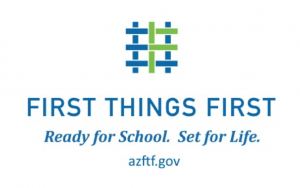 December is crowded with activity and excitement, which can all be fun for young children, but may also have some unintended consequences: behavior changes.
December is crowded with activity and excitement, which can all be fun for young children, but may also have some unintended consequences: behavior changes.
Toddlers and preschoolers can experience a myriad of emotions, including: anticipation of special activities and events; joy (or disappointment) regarding gifts; anxiety being around unfamiliar relatives and situations; confusion over changing routines (including lack of sleep); sadness at missing their caregivers and friends; and feeling let down when, suddenly, all of the seasonal hoopla ends.
First Things First offers the following tips – compiled from various online resources – families can use to help kids navigate these holiday hurdles:
Follow routines. As much as possible, keep morning rituals, naps, bedtimes and meal schedules as consistent as possible. They give kids a sense of security and confidence.
Let kids be kids. Whatever the activity, think of it from your child’s point of view. Make sure they understand what will happen and what is expected of them. Bring things for them to do or play with so they enjoy themselves, too.
Listen to your child’s cues. Changes in eating habits, difficulty sleeping, impulsiveness, withdrawal and tantrums can all be signs that your child is experiencing feelings that they find difficult to express. Talk with your child in a supportive way and help them find ways to work through those emotions.
Be available. Make time for one-on-one activities with your child – reading together, playing with new toys, craft projects, volunteering or exercise. These are ways for your child to feel connected to you despite all the hustle and bustle.
Look back – and forward. Reliving holiday memories and identifying exciting things happening in the next few months – a birthday, a family trip, etc. – are ways to help your child put the holidays in to context.
Even adults often feel overwhelmed by the flurry of holiday activity. By taking time out to check in with our kids (and ourselves in the process), we can keep the holiday blues at bay and make the end of the year a winter wonderland for everyone.
— For more tips and tools for supporting quality and healthy development in the first five years, visit www.FirstThingsFirstAZ.gov.
***
Ayudando a los pequeños a combatir el desencanto en los días festivos
El mes de diciembre está lleno de actividades y novedades que producen gran alegría en los niños pequeños pero también tienen algunas consecuencias inadvertidas como el cambio en el comportamiento.
Los niños preescolares pueden experimentar una infinidad de emociones tales como: entusiasmo por nuevas actividades o eventos; alegría (o desilusión) al recibir regalos; ansiedad por la presencia de familiares que no ven con frecuencia o situaciones poco comunes; confusión sobre el cambio de rutinas (incluyendo la falta de sueño); tristeza por extrañar a sus cuidadores o amigos; y un sentimiento de decepción cuando toda la actividad de la temporada llega a su fin.
Compartimos algunas ideas – provenientes de varios sitios de internet- que los padres de familia pueden usar para ayudar a sus hijos a manejar estas dificultades:
Mantenga rutinas: En lo posible conserve la rutina matutina, siestas, horario para dormir y comidas. Esto brinda un sentido de seguridad y confianza a los niños.
Permita que los niños actúen como niños. No importa el tipo de actividad, procure verlo desde el punto de vista de su niño. Asegúrese que ellos entienden lo que va a pasar y lo que se espera de ellos. No olvide traer cosas para que ellos puedan jugar y entretenerse solos.
Observe las señales que le da su hijo. Cambio en los hábitos alimenticios, problemas para dormir, espontaneidad, rechazo y berrinches pueden ser señales de que su hijo está experimentando sentimientos que no sabe cómo expresar.
Esté disponible. Haga tiempo para interactuar uno a uno con su hijo – lean juntos, jueguen con los juguetes nuevos, hagan manualidades, ejercicio o voluntariado. Estas son algunas formas en las que su hijo se sentirá más cercano a usted a pesar de la gran agitación de la temporada.
Mire hacia atrás – y hacia adelante. Cuando reviven las memorias pasadas o identifican momentos emocionantes que sucederán en los próximos meses –como cumpleaños, viajes familiares, etc.- está ayudando a su hijo a poner en contexto los días festivos.
También los adultos se pueden sentir agobiados por la cantidad de actividades y festejos. Al tomar un momento para checar a los niños (y darnos un minuto a nosotros mismos), podremos prevenir la melancolía de los festejos y crear un fin de año maravilloso para todos.
— Para obtener más consejos y herramientas para apoyar la calidad y el desarrollo saludable en los primeros cinco años , visitar www.FirstThingsFirstAZ.gov.
